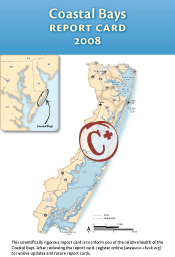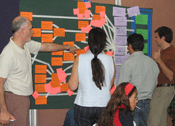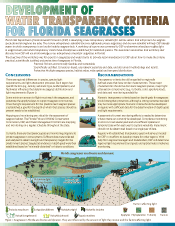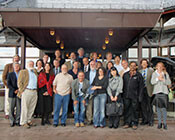IAN Blog and Social Networking
IAN has started blogging and has entered the world of Twitter and Facebook. We also have a new aggregated RSS feed which contains the contents of all our other feeds in one. We'd love to hear back from you via a blog comment, tweet, or a note on our wall. Now you have many different ways to keep up with the latest IAN activities.Maryland Coastal Bays Report Card
 This report card provides a transparent, timely, and geographically detailed assessment of 2008 Coastal Bays’ health. Prepared annually, the report card rates six reporting regions of the Coastal Bays, using six indicators combined into a single overarching index of health. Health is defined as progress towards established scientifically derived ecological thresholds or goals. The overall health of Coastal Bays was moderate in 2008, obtaining a grade of C+. The highest ranked region was Sinepuxent Bay (B), while the lowest ranked regions were Newport Bay and St. Martin River (D+). The report card website enables you to explore the report card in more detail via the regions and indicators.
This report card provides a transparent, timely, and geographically detailed assessment of 2008 Coastal Bays’ health. Prepared annually, the report card rates six reporting regions of the Coastal Bays, using six indicators combined into a single overarching index of health. Health is defined as progress towards established scientifically derived ecological thresholds or goals. The overall health of Coastal Bays was moderate in 2008, obtaining a grade of C+. The highest ranked region was Sinepuxent Bay (B), while the lowest ranked regions were Newport Bay and St. Martin River (D+). The report card website enables you to explore the report card in more detail via the regions and indicators.
IAN partners with Foundations of Success to present training in Adaptive Management for Conservation Success
 The Adaptive Management for Conservation Success program, from Foundations of Success (FOS), addresses the challenges for conservation and natural resource management organizations to show that their efforts are strategic, systematic, and results-oriented. It provides them with the skills and knowledge to design and implement effective projects. The first of three courses in this program, Design and Plan Your Project (pdf), combines hands-on exercises and discussions to help participants conceptualize goals and prioritize strategies, as well as begin to monitor the impacts of their projects. Participants will learn to use tools such as the Miradi Adaptive Management Software, the IAN image library, and the IAN symbol library. For more information, email Mara Guccione at mara@fosonline.org.
The Adaptive Management for Conservation Success program, from Foundations of Success (FOS), addresses the challenges for conservation and natural resource management organizations to show that their efforts are strategic, systematic, and results-oriented. It provides them with the skills and knowledge to design and implement effective projects. The first of three courses in this program, Design and Plan Your Project (pdf), combines hands-on exercises and discussions to help participants conceptualize goals and prioritize strategies, as well as begin to monitor the impacts of their projects. Participants will learn to use tools such as the Miradi Adaptive Management Software, the IAN image library, and the IAN symbol library. For more information, email Mara Guccione at mara@fosonline.org.
Development of water transparency criteria for Florida seagrass
 The Florida Department of Environmental Protection (DEP) is developing a new transparency standard for marine waters that will protect the seagrass species found throughout the state. The current standard does not sufficiently protect seagrasses, and the new standard will help DEP identify waters in which transparency is too low for healthy seagrass beds. A workshop of experts was convened by DEP, and facilitated by Bill Dennison and Caroline Wicks, to determine what factors affect light in seagrass beds and what transparency criteria have already been established for individual systems. This newsletter summarizes that workshop and discusses how DEP will use this knowledge to set transparency criteria for seagrasses in Florida.
The Florida Department of Environmental Protection (DEP) is developing a new transparency standard for marine waters that will protect the seagrass species found throughout the state. The current standard does not sufficiently protect seagrasses, and the new standard will help DEP identify waters in which transparency is too low for healthy seagrass beds. A workshop of experts was convened by DEP, and facilitated by Bill Dennison and Caroline Wicks, to determine what factors affect light in seagrass beds and what transparency criteria have already been established for individual systems. This newsletter summarizes that workshop and discusses how DEP will use this knowledge to set transparency criteria for seagrasses in Florida.
LOICZ Dahlem-type Workshop
 The Dahlem workshop model aims to foster scientific creativity, the exchange of information and ideas between different fields, and the development of new theses on the basis of well-founded research. Bill Dennison and Michael Williams from IAN participated in a week long Dahlem-type workshop on the outskirts of Oslo, Norway. The workshop (pdf), entitled "Global environmental change in the coastal zone: A socio-ecological integration" was sponsored by the Land-Ocean Interactions in the Coastal Zone (LOICZ), part of the International Geosphere Biosphere Programme and the International Human Dimensions Programme on Global Climate Change. Four teams of natural, social, and economic scientists from six continents addressed issues like coastal syndromes, innovation, scale, and governance. IAN products like report cards will be featured in the conference outputs.
The Dahlem workshop model aims to foster scientific creativity, the exchange of information and ideas between different fields, and the development of new theses on the basis of well-founded research. Bill Dennison and Michael Williams from IAN participated in a week long Dahlem-type workshop on the outskirts of Oslo, Norway. The workshop (pdf), entitled "Global environmental change in the coastal zone: A socio-ecological integration" was sponsored by the Land-Ocean Interactions in the Coastal Zone (LOICZ), part of the International Geosphere Biosphere Programme and the International Human Dimensions Programme on Global Climate Change. Four teams of natural, social, and economic scientists from six continents addressed issues like coastal syndromes, innovation, scale, and governance. IAN products like report cards will be featured in the conference outputs.